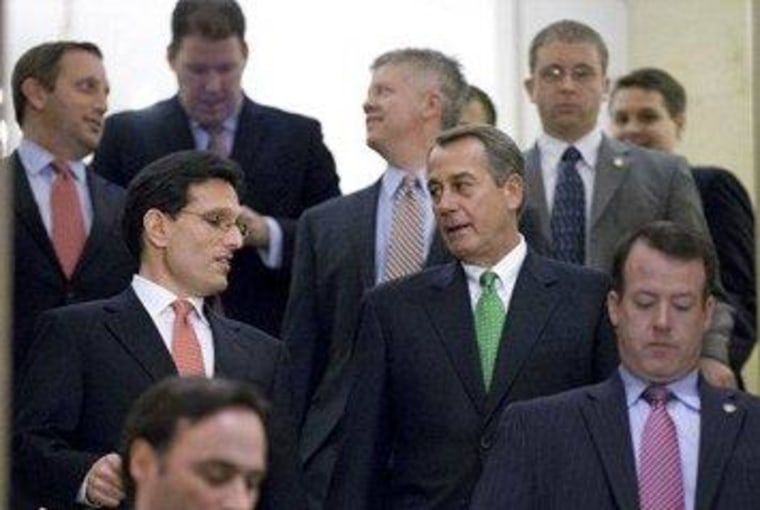I can practically hear you through the series of tubes asking, "Do we really have to think about the debt ceiling again?" Believe me; I feel your pain.
But as unpleasant as this may be, it's important.
We finally have a date for the debt-ceiling showdown. Doomsday is expected to arrive this year between Oct. 18 and Nov. 5.That's according to a new analysis from the Bipartisan Policy Center. At some point in those two weeks, the Treasury Department will have exhausted all its options and will no longer have enough money to meet its financial obligations.
And if we can no longer meet our financial obligations, the nation will default; we will have undermined the full faith and credit of the United States for the first time ever; and the result will likely be an economic calamity affecting Americans and the world.
The good news is, the crisis is incredibly easy to avoid. Congress simply has to pass a bill raising the statutory debt limit. It doesn't cost a dime and the whole process could take a few minutes, start to finish. This is, after all, just routine paperwork, completed by policymakers in both parties several dozen times.
The bad news is, Republicans, who launched the first-ever debt-ceiling crisis in 2011, are eager to do it again. They're aware of the consequences; they recognize the risks; and at this point, they don't care.
Indeed, it's quickly become a key element of the larger congressional GOP budget strategy.
Republican lawmakers have long pushed for a hostage strategy: tell Democrats that the GOP will shut down the government unless they agree to defund the Affordable Care Act and start taking health care benefits away from millions of Americans. The Republican leadership doesn't like that idea, because they don't want to be on the hook for an unpopular shutdown.
So Boehner, Cantor, and others want to trade one hostage for another: they'll keep the government's lights on, then tell Democrats to either defund the Affordable Care Act and start taking health care benefits away from millions of Americans or the GOP will refuse to raise the debt limit, consequences be damned.
And this is the plan the party likes.
Rep Paul Ryan (Wis.), the Budget Committee chairman and GOP 2012 vice presidential candidate, also said members should support the plan. "I think the best fight over ObamaCare is on the debt limit," Ryan said. [...]Conservative Rep. John Fleming (R-La.) said he would oppose the continuing resolution if the leadership did not commit to seeking a one-year ObamaCare delay in the debt ceiling fight.
House Majority Leader Eric Cantor (R-Va.) is on board, too.
Majority Leader Eric Cantor spent 90 percent of a presentation to House Republicans in the Capitol basement this morning explaining and defending his convoluted plan to force the Senate to vote on defunding Obamacare before eventually allowing the upper chamber to send a "clean" CR to President Obama.Towards the end, however, he dropped a big piece of news about the House Republican strategy heading into the next fiscal fight -- over raising the debt ceiling. To increase the debt ceiling, Cantor said, Republicans will demand a one-year delay to Obamacare.
Let's pause to note a minor problem: this plan is stark raving mad. The problem is not just that it's based on profound policy ignorance -- though it is -- but it's a wildly reckless scheme that doesn't even make strategic sense.
As Ezra Klein recently explained, "Trading a government shutdown for a debt-ceiling breach is like trading the flu for septic shock. And Boehner knows it. Republicans will effectively be going to the White House and saying, 'Delay the health-care law or we will single-handedly cause an unprecedented and unnecessary global financial crisis that everyone will clearly and correctly blame on us, destroying our party for years to come.' ... This is not a safe way to govern the country."
During the last Republican debt-ceiling crisis, Americans were forced to endure months of fruitless negotiations while the economy took a severe hit, along with the nation's global reputation. If there's any upside to this, it's that the crisis will be truncated -- we won't have months of this insanity; we'll have weeks of this insanity. Though there is no firm deadline, as noted above, it's possible the drop-dead date will be as early as Oct. 18.
That's just five weeks away. If there are any grown-up Republicans left on Capitol Hill, now would be an excellent time for them to speak up.
